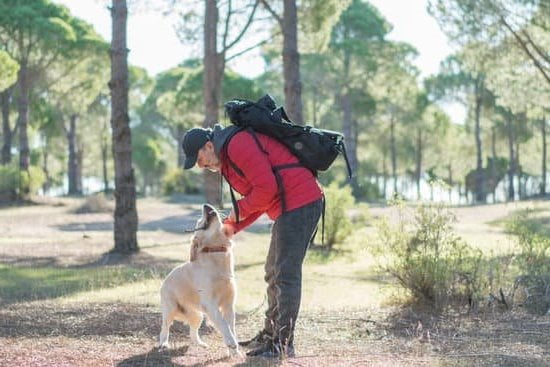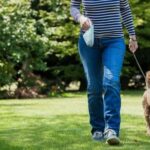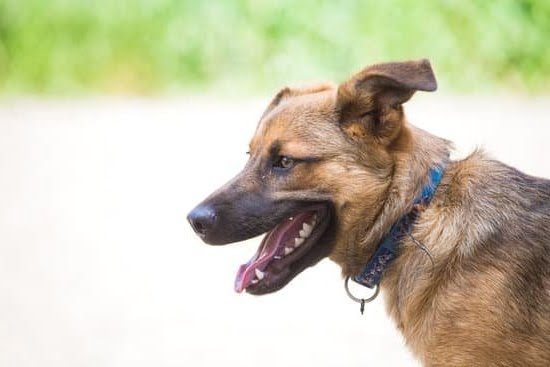As much as we love our furry companions, the reality is that accidents can happen. And when it comes to potty training, it’s often thought that teaching an old dog new tricks is nearly impossible. But is that really the case? Can you potty train old dogs?
In this article, we will delve into the world of potty training adult canines, specifically focusing on older dogs. We will explore the feasibility of teaching them proper toilet habits and provide insights into the challenges that may arise during the process.
Many factors make potty training old dogs tricky. Age-related issues such as declining muscle control or health conditions may present obstacles in their ability to learn new behaviors. However, we will debunk common myths associated with this topic and address popular beliefs about potty training adult dogs.
While it may require some patience and adjustments to traditional training techniques, determining if old dogs can indeed be potty trained is essential for a harmonious household. In the following sections, we will discuss step-by-step guides for starting from scratch with an older dog and offer advice on tailoring your approach for senior dogs with health issues.
It’s important to remember that managing frustration and maintaining consistency are key elements in the potty training process. Therefore, we will also provide tips on how to stay patient throughout the journey and address common obstacles or roadblocks that may arise.
Ultimately, despite the challenges that come with teaching older dogs proper toilet habits, celebrating successes should not be overlooked. We’ll emphasize recognizing and rewarding achievements along the way.
So let’s embrace this challenge together and realize that with dedication and perseverance, potty training old dogs is indeed possible. With our guidance through each step of the process, you’ll soon find yourself on a path towards success in cultivating proper bathroom habits in your senior four-legged friend.
Understanding the Challenges
Potty training old dogs can be a challenging task due to various factors that make it tricky. Understanding these challenges is important in order to approach the training process effectively and with realistic expectations.
Age-related physical limitations
Older dogs might face physical limitations that hinder their ability to control their bladder and bowel movements. Issues such as arthritis, joint problems, or muscular weakness can make it more difficult for them to hold their urine or feces for extended periods of time.
Additionally, senior dogs may have decreased muscle tone in their rectal area, making it harder for them to control elimination. It’s important to take these limitations into consideration when developing a potty training plan for an older dog.
Established habits and routines
Older dogs may have already established habits and routines related to elimination. They might have learned to go potty in certain areas of the house or developed a preference for specific surfaces such as carpet or grass. Changing these ingrained behaviors can be more challenging than teaching a young puppy from scratch. It may require additional patience, consistency, and positive reinforcement to break existing habits and establish new ones.
Possible underlying medical conditions
When it comes to potty training older dogs, it’s crucial to consider any potential underlying medical conditions that could be affecting their ability to control their bladder and bowel movements. Conditions like urinary tract infections, kidney disease, or diabetes can cause increased urination or accidents.
If your senior dog is having difficulty with potty training despite consistent efforts, it’s advisable to consult with a veterinarian who can assess their health and rule out any medical issues that may be contributing to the problem.
Understanding these challenges will help set realistic expectations and tailor the potty training approach specifically for old dogs’ unique circumstances. With proper understanding and preparation, owners can successfully navigate the difficulties inherent in potty training older dogs and increase the chances of a successful outcome.
Debunking Myths
Older dogs can be potty trained, despite popular beliefs that suggest otherwise. Many people assume that older dogs are set in their ways and unable to learn new habits, but this is a common myth. In this section, we will address these misconceptions and debunk the popular beliefs about potty training adult canines.
One common myth is that if a dog hasn’t been potty trained as a puppy, it’s impossible to teach them as an adult. However, dogs of any age can learn new behaviors with proper training and consistency. While it may take more time and patience to potty train an older dog compared to a puppy, it is definitely possible.
Another myth is that older dogs won’t be motivated by rewards or positive reinforcement. This couldn’t be further from the truth. Dogs of all ages respond well to rewards such as treats or praise when they exhibit desired behaviors. Positive reinforcement is an effective method for potty training adult canines and should not be overlooked.
A third popular belief is that if an older dog has had accidents in the house for years, there’s no hope for them to become reliably potty trained. While it may be more challenging due to established habits, consistent training and patience can lead to success. It’s important to identify any underlying reasons for accidents, such as medical issues or anxiety, and address those as part of the training process.
| Myth | Reality |
|---|---|
| Dogs cannot be potty trained if they weren’t trained as puppies. | Dogs of any age can learn new behaviors with proper training and consistency. |
| Older dogs are not motivated by rewards or positive reinforcement. | Dogs of all ages respond well to rewards and positive reinforcement. |
| If an older dog has had accidents for years, they cannot be reliably potty trained. | With consistent training and patience, even older dogs can become reliably potty trained. |
By debunking these misconceptions, it becomes clear that potty training adult canines is indeed possible. With the right approach, patience, and consistency, old dogs can learn new tricks and develop proper toilet habits. In the next section, we will explore how to assess the feasibility of potty training older dogs in more detail.
Assessing the Feasibility
Potty training old dogs may seem like a daunting task, but it is indeed feasible with the right approach and understanding. Many dog owners have successfully potty trained their adult canines, dispelling the notion that it is too late to teach an old dog new tricks. However, it is important to consider factors such as breed, health issues, and previous training experiences when assessing the feasibility of potty training an older dog.
One factor that can impact the feasibility of potty training in older dogs is their health. Older dogs may suffer from mobility issues or conditions that affect their bladder control, making it more challenging for them to hold their urine or make it outside in time.
In these cases, it is crucial to consult with a veterinarian to rule out any underlying medical conditions and get guidance on how to manage and accommodate your dog’s specific needs during the potty training process.
Another consideration when assessing feasibility is the dog’s previous training experiences. If your older dog has not been previously taught proper toileting habits or has developed bad habits over time, re-training may require more effort and patience. However, with consistency and positive reinforcement techniques, dogs can learn new behaviors regardless of their age.
To assess whether an old dog can be potty trained, it is essential to observe their behavior patterns. How long can they hold their bladder? Do they exhibit any signs or signals when they need to go? Understanding these cues will help you tailor a suitable potty training plan for your dog based on their individual needs and capabilities.
| Factors | Considerations |
|---|---|
| Health | Dogs with health issues may require additional accommodations during potty training. |
| Previous Training | Dogs with no previous potty training may require more effort and patience. |
| Behavior Patterns | Understanding your dog’s cues and capabilities will help tailor the training plan. |
Starting from Scratch
Potty training an older dog can be a challenging task, but with the right approach and consistency, it is definitely possible. In this section, we will provide you with a step-by-step guide to help you potty train your older canine companion.
- Establish a Routine: Dogs thrive on routines, so it’s important to establish a consistent schedule for their potty breaks. Take your dog outside to their designated bathroom spot at the same times every day – first thing in the morning, after meals, before bedtime, and so on.
- Watch for Signs: Learn to recognize the signs that your dog needs to go potty. These signs may include restlessness, circling or sniffing around, pacing, or sudden attentiveness. When you see these signs, immediately take your dog outside to their bathroom spot.
- Use Positive Reinforcement: When your dog successfully eliminates outside, reward them with praise and treats. Positive reinforcement helps reinforce the desired behavior and encourages your dog to continue doing it.
- Limit Access Indoors: To prevent accidents indoors, keep your older dogs confined to a smaller area of the house when you are not able to supervise them closely. Consider using baby gates or crates to create a designated space for them.
- Clean Accidents Properly: If accidents do happen indoors (which is normal during the training process), clean them up thoroughly using enzymatic cleaners specifically designed to eliminate pet odors. Regular household cleaners may not completely remove the scent of urine or feces, which can attract dogs back to those areas.
- Be Patient and Consistent: Potty training an older dog takes time and patience. It’s important to be consistent with your training approach and not get discouraged by setbacks or accidents along the way. Stay positive and keep reinforcing good behavior.
By following this step-by-step guide and remaining consistent in your training efforts, you can successfully potty train your old dog and help them develop proper toilet habits. Remember to be patient, understanding, and celebrate small victories along the way. Potty training is a journey, but with time and effort, it can be accomplished.
| Step | Description |
|---|---|
| 1 | Establish a Routine: Take your dog outside at specific times every day. |
| 2 | Watch for Signs: Recognize when your dog needs to go potty. |
| 3 | Use Positive Reinforcement: Reward your dog for eliminating outside. |
Tailoring the Approach
As our furry friends age, they may experience health issues that can affect their ability to control their bladder and bowels. It is important to understand that potty training techniques for senior dogs with health issues need to be adjusted to accommodate their specific needs. Here are some tips on tailoring the approach when potty training an older dog with health issues:
- Consult with your veterinarian: Before starting any potty training regimen, it is crucial to consult with your veterinarian. They will be able to assess your dog’s health condition and provide guidance on how to proceed. They can also help rule out any underlying medical conditions that may be causing accidents.
- Manage medication and diet: Certain medications or dietary changes may impact a dog’s bathroom habits. Work closely with your vet to ensure that you are managing their medication and diet effectively. Adjustments may need to be made to minimize accidents or discomfort during the potty training process.
- Increase frequency of potty breaks: Older dogs may have reduced bladder control, so increasing the frequency of potty breaks is essential. Take your senior dog outside more frequently, especially after meals, naps, and playtime. This will give them more opportunities to relieve themselves in an appropriate place.
- Consider using pee pads or diapers: For senior dogs with mobility issues or severe health problems, using pee pads or diapers can be a practical solution. These products are designed to absorb urine and protect your flooring or furniture from accidents when your dog cannot make it outside in time.
- Modify the environment: Make sure your home environment is conducive to easy access for your senior dog during potty training. Set up ramps or stairs if needed, so they can reach the designated potty area without difficulty.
By adjusting the training techniques for senior dogs with health issues, you can create a more comfortable and successful potty training experience for both you and your furry companion.
Patience is Key
Potty training an old dog can be a challenging process that requires patience and consistency. It is important to remember that it may take some time for an older dog to learn new habits, especially if they have been accustomed to using the bathroom indoors for a long period of time. Managing frustration and maintaining consistency throughout the potty training process is crucial for success.
Understanding the Importance of Patience
When potty training an old dog, it is important to approach the process with patience. Remember that your dog may not have been exposed to consistent potty training in the past, so they will need time to adjust and understand what is expected of them.
It is common for older dogs to have accidents during the learning process, but it is essential to remain patient and avoid becoming frustrated or angry with them. Punishing or scolding your older dog during potty training can cause anxiety and hinder their progress.
Maintaining Consistency
Consistency is key when potty training an older dog. Establishing a regular routine for bathroom breaks can help your dog understand where and when they are supposed to go.
Take your older dog outside at consistent times throughout the day, such as after meals or waking up from a nap, to give them ample opportunity to relieve themselves outside. Be sure to use consistent cues, such as verbal commands or specific areas designated for bathroom breaks, so your dog understands what you expect from them.
It is also important to be consistent with positive reinforcement. When your older dog successfully goes potty outside, be sure to praise and reward them immediately with treats or verbal praise. This positive reinforcement helps reinforce good behavior and encourages them to continue using proper toilet habits.
Coping with Frustration
Potty training an old dog can be frustrating at times, especially if progress seems slow or setbacks occur. It is important to find positive ways to cope with your frustration during the process. Take breaks when needed to give yourself and your dog a chance to relax and regroup.
Remember that every dog learns at their own pace, and some may take longer than others to catch on. Seek support from a professional dog trainer or join online communities where you can share experiences and gain advice from others who have successfully potty trained older dogs.
Troubleshooting
When potty training an old dog, it is important to anticipate and address common obstacles and roadblocks that may arise during the process. By troubleshooting these challenges, you can ensure a smoother training experience and increase the chances of success.
Establishing a Routine
One common obstacle during potty training is establishing a consistent routine for your older dog. Older dogs may have developed habits or preferences when it comes to eliminating, making it more challenging to introduce a new routine. To overcome this hurdle, it is crucial to be patient and persistent in establishing a routine that works for both you and your dog.
Take your dog outside at regular intervals throughout the day, such as first thing in the morning, after meals, and before bedtime. Consistency is key in reinforcing the desired behavior.
Dealing with Accidents
Accidents are bound to happen during the potty training process, especially with older dogs who may have weaker bladder control or other health issues. It is important not to punish or scold your dog for accidents as this can create anxiety and hinder progress.
Instead, focus on managing accidents by promptly cleaning up any messes using enzymatic cleaners specifically designed to eliminate pet odors. Additionally, consider using belly bands or diapers for male dogs to prevent accidents indoors while still providing them with comfort and dignity.
Addressing Anxiety or Fear
Some older dogs may experience anxiety or fear related to potty training due to past negative experiences or medical conditions. This can lead to resistance or reluctance when it comes to eliminating outdoors.
To address this challenge, create a calm and positive environment during potty breaks by rewarding your dog with treats or praise when they eliminate outside. Consider consulting with a professional dog trainer or behaviorist who can provide guidance on addressing anxiety or fear-related issues during potty training.
By addressing these common obstacles and roadblocks during potty training, you can increase the chances of success and create a positive experience for your older dog. Remember to have patience and maintain consistency throughout the process, as potty training an old dog may take more time and effort compared to training a younger puppy. With dedication and proper techniques, it is possible to overcome these challenges and achieve success in potty training your older canine companion.
Celebrating Success
Potty training an old dog can be a challenging process, but with patience, consistency, and the right approach, it is certainly achievable. One crucial aspect of potty training that should never be overlooked is recognizing and rewarding your dog’s successes. Celebrating milestones along the potty training journey not only reinforces positive behavior but also strengthens the bond between you and your furry friend.
To effectively celebrate success, it is important to identify what motivates your older dog. Some dogs respond well to verbal praise, while others may require tangible rewards such as treats or toys. Whatever method you choose, consistency is key. For example, if you opt for treats as a reward, it is essential to provide them immediately after your dog eliminates in the designated area every single time. This creates a clear association between the action and the reward.
In addition to rewards, positive reinforcement through praise is equally important. Whenever your dog successfully relieves themselves outside or in their designated spot indoors, shower them with enthusiastic verbal accolades such as “Good job.” or “Well done.” The tone of your voice should signal joy and satisfaction, letting them know they have done something worth celebrating.
Furthermore, incorporating a visual cue can aid in recognizing achievements during the potty training journey. Keep a chart or a checklist where you can mark off successful bathroom breaks or accidents avoided. This visual representation not only serves as a keepsake of progress but also provides motivation to keep going.
Overall, celebrating success plays an integral role in potty training an old dog successfully. By finding what motivates your furry friend and consistently rewarding and praising their accomplishments, you create a positive environment that encourages good bathroom habits. This positive reinforcement will help instill desired behaviors over time and ensure that your senior canine companion becomes fully potty trained.
Beyond the Basics
Maintaining proper toilet habits in adult dogs is essential for their overall health and happiness. Once you have successfully potty trained your older dog, it is important to continue reinforcing good habits and preventing any relapses. Here are some tips to help you maintain proper toilet habits in your adult dog:
- Consistency is key: Continue to follow a consistent schedule for feeding and taking your dog outside to eliminate. Dogs thrive on routine, so sticking to a regular schedule will help them understand when it’s time to go outside.
- Supervision is essential: Keep a close eye on your dog, especially in the early stages of maintaining their toilet habits. If you notice any signs that they need to go, such as pacing or sniffing around, immediately take them outside to their designated potty area.
- Reinforce positive behavior: When your adult dog successfully eliminates outside, make sure to praise them and give them a treat as a reward. Positive reinforcement will help reinforce their good behavior and motivate them to continue going in the right place.
- Clean up accidents properly: Accidents happen, even with well-trained dogs. When accidents occur indoors, it’s crucial to clean up the mess thoroughly using an enzymatic cleaner specifically designed for pet stains and odors. This will remove any lingering scent that might encourage your dog to eliminate in that spot again.
- Be patient and understanding: Remember that accidents may still happen occasionally, especially if your dog experiences changes or stressors in their environment. Instead of getting frustrated, remain patient and understanding with your furry friend as they continue learning and adjusting.
By implementing these tips into your daily routine, you can effectively maintain proper toilet habits in your adult canine companion and minimize the likelihood of any setbacks or relapses in their training progress.
Conclusion
Potty training can be a daunting task, especially when it comes to old dogs. However, with the right approach and understanding of their unique challenges, it is indeed possible to successfully potty train adult canines. It may require some extra effort and patience, but the rewards are well worth it.
Throughout this article, we have explored the feasibility of potty training old dogs and debunked common myths surrounding this topic. We have learned that while it may be more challenging to potty train senior dogs due to factors such as diminished bladder control or previous habits, it is not impossible.
In order to effectively potty train an older dog, it is important to start from scratch and follow a step-by-step guide. A tailored approach may also be necessary for senior dogs with health issues. Patience is key during this process, as setbacks and frustrations are bound to occur. However, by staying consistent and managing frustration levels, progress can be made.
Additionally, troubleshooting common obstacles and roadblocks will help navigate any difficulties encountered along the way. Celebrating successes and rewarding your dog’s achievements will serve as positive reinforcement throughout the potty training journey.
Lastly, maintaining proper toilet habits in adult dogs goes beyond the basics of initial potty training. Developing a routine, providing opportunities for regular bathroom breaks, and paying attention to any changes in behavior or health will contribute to long-term success.
In conclusion, potty training old dogs requires dedication and understanding of their specific challenges. However, with the right approach and consistency, it is possible to achieve success. So don’t be discouraged. Embrace the challenge with confidence knowing that you can indeed potty train your old dog and create a happy and hygienic living environment for both of you.
Frequently Asked Questions
What is the best way to potty train an older dog?
The best way to potty train an older dog is through consistency, patience, and positive reinforcement. Start by establishing a routine for your dog in terms of feeding, bathroom breaks, and exercise. Take them outside frequently to the designated potty area and reward them with treats and praise when they eliminate in the appropriate spot. Supervise them inside the house, confining them to a small area or using a crate when you cannot directly supervise.
If accidents happen, avoid punishment as it may lead to fear or anxiety. Instead, clean up accidents thoroughly without scolding your dog. With time, repetition, and encouraging behavior with rewards, your older dog will learn the desired potty habits.
How do you house train a 10 year old dog?
House training a 10-year-old dog follows a similar approach as potty training any other age group but may require some additional considerations due to their age and potential health issues. Firstly, consult with a veterinarian to rule out any medical causes for accidents or difficulties in holding urine or feces for longer periods. Maintain a consistent routine for feeding times and bathroom breaks; this helps establish regularity in eliminating waste.
Supervision is crucial during the house training process to prevent accidents indoors while rewarding good behavior outside remains important. Older dogs might take longer than puppies to adjust to new routines but remain patient and seek guidance from professional trainers if necessary.
Can you train an older dog to use pee pads?
Yes, it is possible to train an older dog to use pee pads if required for specific situations such as living in an apartment or having limited outdoor access. To train an older dog to use pee pads successfully, begin by designating a specific spot where you want them to use the pad consistently – ideally away from their eating or sleeping area. Use positive reinforcement techniques like treats and praise whenever they eliminate on the pad correctly.
Gradually reduce the size of the pee pad over time until it is no longer needed or replace it with an appropriate outdoor potty spot once they have established the desired behavior. Keep in mind that while pee pads can be convenient, they should not replace regular outdoor exercise and potty breaks for your dog’s overall health and well-being.

Welcome to the blog! I am a professional dog trainer and have been working with dogs for many years. In this blog, I will be discussing various topics related to dog training, including tips, tricks, and advice. I hope you find this information helpful and informative. Thanks for reading!





